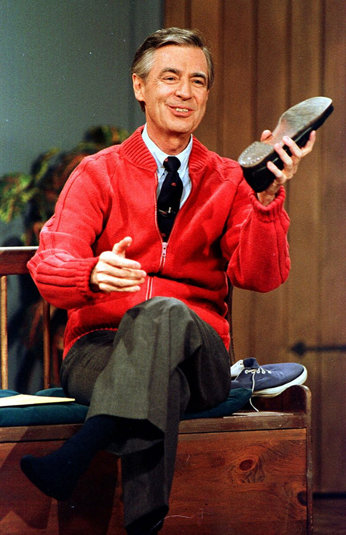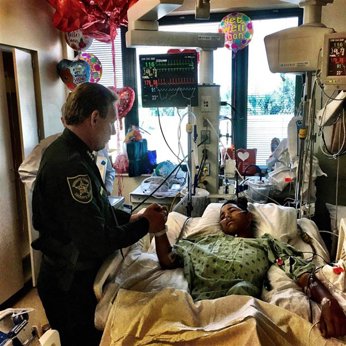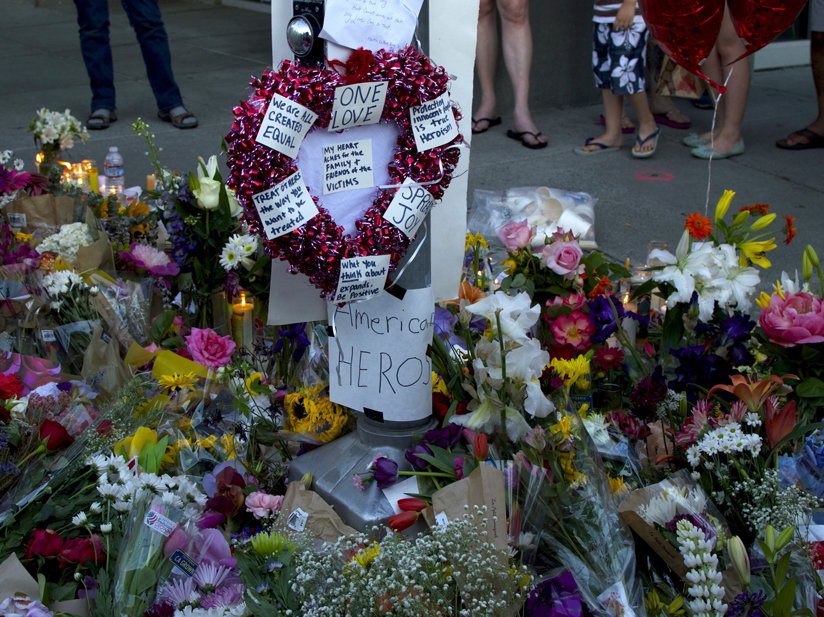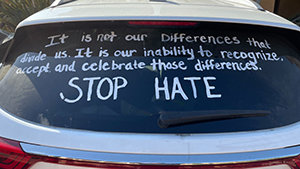This Year’s Heroes Against Hate—
The Real All-Stars
OK. This blog began way differently. This is baseball All-Star season, when the best of the best are selected for the annual All-Star game. How about an “All-Rats” lineup (Rats is Star spelled backwards) of this year’s leading bigots and anti-religionists? What a clever idea, I thought. I would name them and their dubious “achievements.” A very on-point, in-your-face blog.

But then something happened to me this morning. I was myself hated over my religious beliefs by a couple of people whom I thought I knew. And I must confess it got to me. So, I changed my mind and I changed this blog.
Instead of dignifying haters by giving them names, I will post a STOP sign right here in cyberspace. In this little corner of the universe and for these few moments we spend together—you and I—no hating and no bad news is allowed. I will instead recognize the true All-Stars of this year—people who have devoted or even sacrificed their lives for tolerance, decency, kindness, selflessness and help. A baseball team has a starting nine that take the field. Here are mine, in no particular order—this year’s true All-Stars.
Fred Rogers

More familiarly known as Mr. Rogers. Although gone from us since 2003, he is back in the conversation as a beacon of decency and kindness thanks to the documentary, “Won’t You Be My Neighbor?” now in theaters. For over thirty years as the anchor and face of “Mr. Rogers’ Neighborhood,” he made bold statements against racism and exclusion using a gentle voice and a light touch. Himself an ordained minister, he famously said, “When I say it’s you I like, I’m talking about that part of you that knows that life is far more than anything you can ever see or hear or touch. That deep part of you that allows you to stand for those things without which humankind cannot survive. Love that conquers hate, peace that rises triumphant over war, and justice that proves more powerful than greed.”
Picton, Ontario, Canada
A small community of 25,000, Picton not only insisted but demanded to house and sponsor as many Syrian refugees as could be sent there. In an era of exclusion and suspicion of “people who are different,” Pictonians opened their hearts and homes to grateful strangers. One Picton mother of three commented, “We’ve got four bedrooms, a basement and broad shoulders. What else is life about?” A six year-old girl greeted the first arrivals with a hand-drawn poster: “I love you. You can share my crayons.”
He sustained five severe wounds, lost one third of his lung, but miraculously survived. “I’m no hero,” he said, thus officially passing the primary test of a hero.
Tony McAleer
Tony was once a professional hater. He organized far-right groups and spent years recruiting skinheads. One day he realized: “I traded my humanity for acceptance until I had nothing left.” Now, using his experiences as a hatemonger, he helps others through his nonprofit, Life After Hate, a group that helps racists and bigots close the door on violence and make up the damage to those they’ve hurt.
Luke Mickelson
Luke’s life changed when he saw a homeless child sleeping on what he called “a nest of clothes.” He promptly went home and built her a bed. “When we delivered the bed, she just hugged it and wouldn’t let go.” He was astonished to learn that many children in his Idaho hometown had no bed to sleep in. He quit his high-paying job, and founded the nonprofit Sleep in Heavenly Peace, which has the motto, “No kid sleeps on the floor in our town.” Mickelson’s dream has spread to other communities from coast-to-coast, and now includes training courses and construction manuals. “You walk in and these kids are just so excited,” Mickelson said. “They want to help build it. They want to run the drills. They want to bring in wood. Just giving a kid a sense of ownership, a sense of responsibility, as well as a good night’s sleep, is tremendous for them. They learn how to take care of things. They learn value. They get confidence—and they get a good night’s sleep.” To date, Mickelson’s group has distributed nearly 2,000 beds to needy kids.
Anthony Borges

A 15-year-old student at the Marjorie Stoneman Douglas High School at the time of the hate crime, he barricaded a classroom door and used his body as a shield as the bullets flew, protecting a class full of 20 students from harm. He sustained five severe wounds, lost one third of his lung, but miraculously survived. “I’m no hero,” he said, thus officially passing the primary test of a hero. “I’m just glad I’m alive. This shouldn’t have happened here or anywhere.”
The Halifax, Virginia Police Department
The community-minded PD decided to forge closer ties with its local residents by enforcing a fictional “Vehicle Code 1739,” which makes it illegal to drive on a hot day without an ice cream cone. They stopped drivers, asked them if they were aware of the vehicle code, and when the nervous reply was “no,” they explained what it was, indicated that the driver was in violation of it, and summarily presented him or her with a free ice cream cone. A video depicting one such “arrest,” complete with surprised laughter, went viral. Police Chief Kevin Lands commented: “We just wanted to put smiles on some people's faces that day. We’re humbled with all the kind comments that have been made. We love our community and we’re just happy to serve.”
Ricky John Best, Taliesin Myrddin Namkai-Meche, Micah Fletcher
Hate crime rates in the country’s largest cities have increased for the past four years in spite of overall crime rates declining since the early 1990s, according to the Center for the Study of Hate and Extremism at California State University, San Bernardino. Hate crimes against Muslims in particular have grown proportionately, as well as numerically. They now account for 4.4 percent of all reported hate crime, even though Muslims are estimated to be only one percent of the population.
Ricky, Taliesin and Micah were strangers on a Portland light rail train. Their lives would intertwine when Jeremy Joseph Christian, a white supremacist, harassed and threatened two teenage girls, one of whom was wearing a hijab.

When the three rose spontaneously to intervene, Christian violently attacked them, stabbing Ricky and Taliesin to death and seriously injuring Micah.
Three men from different backgrounds: Ricky, a 53-year-old retired Army vet and father of four; Taliesin, a recent college grad working at a consulting firm; and Micah, a university student and poet whose works have addressed racism, bigotry and social justice—all three strangers, yet sharing a willingness to stand against hate.
Destinee Mangum, one of the two teens rescued by the men, said: “They put their life on the line for me, and they didn’t even know me.”
She added: “Without them, we probably would be dead right now.”
As Taliesin was being carried away on a stretcher, he delivered what would be a few of his last words: “Tell everyone on this train I love them.”
Ricky John Best, who leaves behind his wife and four children, served his country—including tours of duty in Iraq and Afghanistan—for 23 years. He once ran for county commissioner because he wanted to seek change in his local government instead of just complain about it.
He added at the time: “I can’t stand by and do nothing.”
Chad Houser
An award-winning chef in Dallas, Texas, Chad was asked to teach eight local juvenile detention center inmates how to make ice cream for a local competition. Houser saw talent, drive and enthusiasm in the youths. When one of them won the grand prize, beating out culinary professionals citywide, Chad had his “aha moment.” In Texas, more than 40 percent of juveniles are reincarcerated within three years of release. “The system is rigged based on choices that were made for them, not by them—the color of their skin; the part of town where they were born; the schools that they had access to,” Chad said. “I thought, ‘If you’re not willing to do something, you’re a hypocrite.’” To date, Chad’s Café Momentum, an upscale restaurant and nonprofit that incorporates a 12-month paid internship for young men and women coming out of Dallas County juvenile facilities, has helped hundreds of young people break the cycle of violence and crime.
James Shaw Jr.
Someday, hopefully soon, we won’t need to chronicle those who’ve put themselves in hate’s way, at their own peril, to save the lives of others, but this year’s All-Star team wouldn’t be complete without James, the “Waffle House hero.” Coming back from a fraternity house party at about 2:30 a.m. April 22nd, James decided on some waffles. About an hour later he pulled into a waffle house in Antioch, Tennessee, when chaos broke out. A shooter, wearing only an overcoat, opened fire, killing four and wounding four others. Shaw, in a corner, jumped out, rushed the killer, and wrested the rifle from him at the risk of his own life. The suspect fled and was later apprehended by police. Again, the familiar refrain, “I’m no hero.” After being discharged from the Nashville, Tennessee hospital for treatment of his own minor wounds, James went home, changed his clothes, and went to church.
And there you have them: this year’s true All-Star team. The roster isn’t complete, however. It never is. You can add your own candidates, or better yet, try out for the squad yourself. We accept all races, colors, religions. The only requirement is that you subscribe to the belief that, in the words of Mr. Rogers, “life is for service.”










